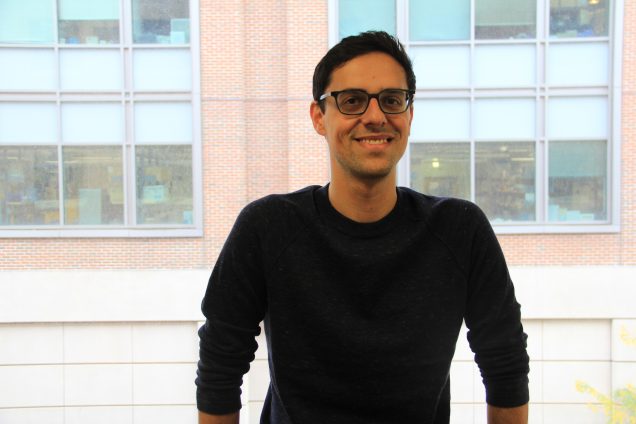FACULTY FEATURE: Mario Muscedere

For Dr. Mario Muscedere, it all started with animals. During the weekends and summers of his childhood, the Baltimore, Maryland native would rise with the sun and escape with his dog, a mutt and former stray, to explore the woods and streams surrounding his suburban neighborhood, not returning home to reality until the dark swallowed the day.
“I was one of those kids who had to be restrained if there was a dog, cat, or any kind of animal around,” Dr. Muscedere said. “I was turning over rocks, always begging to go to the zoo, anything I could get I could not get enough of.”
Now, Dr. Muscedere is a full-time lecturer, with roles in both the Undergraduate Program in Neuroscience and the Department of Biology at Boston University. Currently, he instructs BI/NE 545: Neurobiology of Motivated Behavior in the fall and BI 315: Systems Physiology and BI 542: Neuroethology in the spring. Although his intrigue with the interaction between animals and behavioral biology has been a constant in his life, he was not introduced to the field of neuroscience until he arrived at BU for his Ph.D.
“I graduated with a B.S. in Biology from the University of Maryland, so I didn’t really have any neuroscience experience until I came here,” Dr. Muscedere said. “I did my Ph.D. research in the Traniello Lab, and I thought I was just going to study termite behavior, because that’s what I was doing as an undergraduate. But the Traniello Lab was discussing a new project they wanted to explore- the physiology and neurobiology that underlies behaviors in ants. The lab was heading in that direction, and that was the first time I really started to become a neuroscientist.”
For his graduate research, he focused on studying the sensory, neuromodulatory, and behavioral mechanisms that support task performance of individual worker ants in cooperative colonies. During this time, he also learned how to perform basic neuroscience laboratory techniques, such as brain dissections and immunocytochemistry, to investigate the brain anatomy and neurochemistry of their ant subjects. Then, as a postdoctoral faculty fellow and lecturer for BU’s Undergraduate Program in Neuroscience, he assisted in the revamping of the undergraduate neuroscience major – planning and creating course themes and topics along with lab manuals and the curriculum.
“I did that for about three years, and then I got a job teaching at a small liberal arts college in Arkansas,” Dr. Muscedere said. “I worked there for three years- great school, great students- but decided to come back to Boston because it was just the right move. So when this job opened up, I went for it.”
Dr. Muscedere returned in September of 2017, making this year his second academic school year as a full time lecturer at BU. Here, he says that BU gives him the freedom to try new things, especially in terms of instructional strategies, whether that be clicker questions or starting new classes to give students interesting experiences. Additionally, as a lecturer, he is able to form meaningful academic relationships with students.
“The best part of my day is just sitting in office hours and having people come by and talking about the subject,” Dr. Muscedere said. “It can be hard to make those one-on-one relationships when you teach really big classes, but in some of my upper level classes that are about 15 students it’s a lot easier and that’s what I really like: having that personal effect on somebody’s career, having an ‘aha’ moment with them.”
He accredits this opportunity to have a personal effects with students to tight knit community of the neuroscience department.
“I think with the neuroscience program in particular, since it’s small we think a little more about undergraduate experience, whereas in some of the bigger departments where the divisions are more spread out, that’s harder to do,” he said. “So I think that it’s easier for us to get to know students than it is for some of the other programs.”
While his current focus is undergraduate education, he continues to work on research, working collaboratively with the Traniello lab and finishing up some of the projects he started in his previous job. Dr. Muscedere’s studies aim to understand how worker brain evolution may be linked to the behavioral, social, ecological, and life history variation that exists among species- investigating sensory deprivation and neuroplasticity, among other areas.
“How animals in social groups make decisions and think strategically… it’s something that applies to humans too,” he said.
For current students, he has one piece of advice.
“Think about what you might want to do when you graduate and set yourself up now to get where you want to go, as opposed to scrambling in the last two years,” Dr. Muscedere said. “So start reaching out to your professors, ask about research and shadowing opportunities, volunteering, and UROP projects. Build towards getting experience because that is what will help you get where you want to go.”
According to Dr. Muscedere, anybody who is college now for neuroscience is presumably going to witness incredible gains made in the next 30-50 years- because of this, going to graduate school for neuroscience opens up the opportunities to work on projects that are truly cutting edge.
“In many ways, the field of neuroscience is still in its infancy,” Dr. Muscedere said. “The central problem in neuroscience, or at least behavioral neuroscience, is how do we connect activity of neural circuits to behavior? That question is still almost wide open, and what better time to get involved than in the beginning?”
Written by: Emme Enojado
Editor: Yasmine Sami